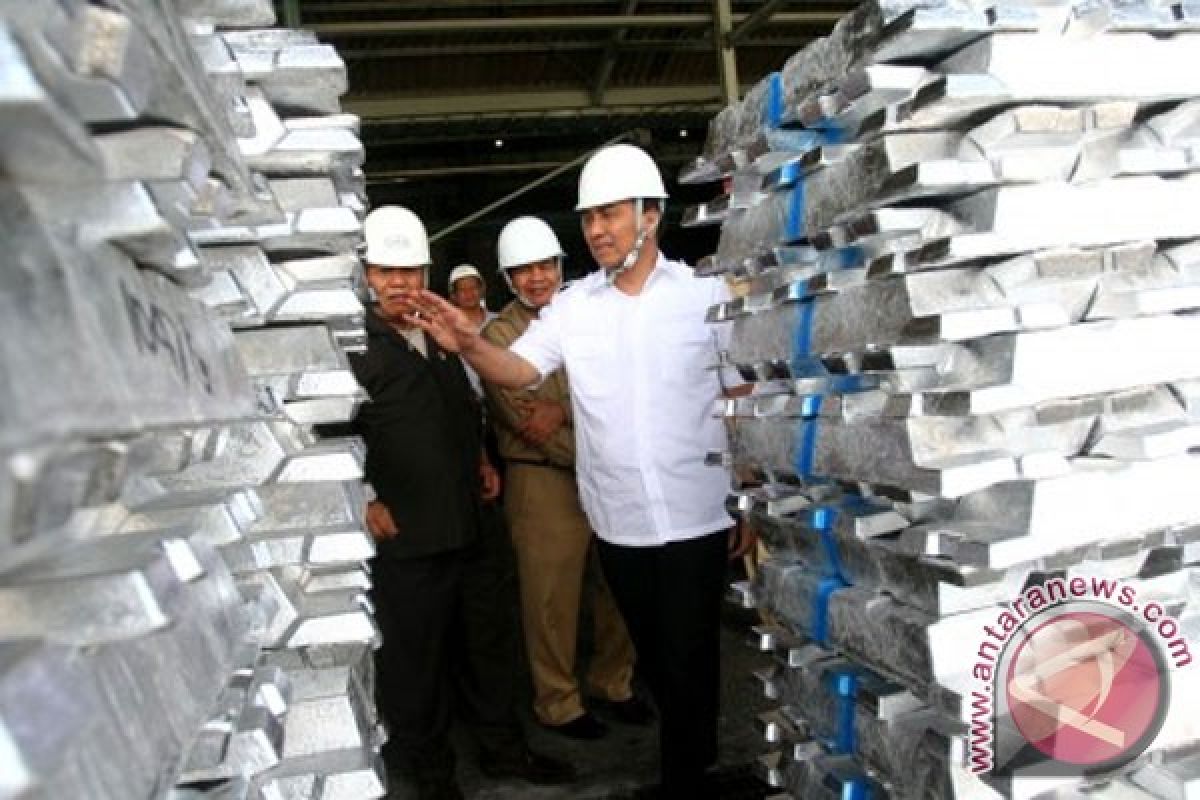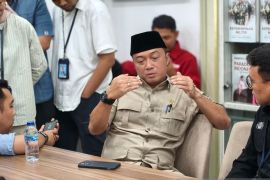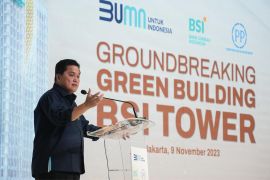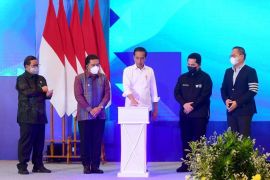The House made the decision in its joint meeting with all parties, as the government decided not to extend the expired contract of PT Inalum, an aluminum joint venture between Indonesia and Japan in which Indonesia held 41.13 percent of the company`s shares and Japan owned 58.87 percent.
"House Commission VI and the government agree to hand over the management of Inalum to the State-Owned Enterprises Ministry based on the law," Commission VI Chairman Airlangga Hartarto said when reading a statement at the conclusion of the joint meeting with Industry Minister MS Hidayat and SOE Minister Dahlan Iskan, at the Parliament building here on Tuesday night.
The meeting was also attended by Head of the Government Development and Finance Comptroller (BPKP) Mardiasmo and North Sumatra Governor Gatot Pujo Nogroho.
The House agreed to the results of negotiations carried out by The Asahan Project Negotiation Team, formed by the President in 2010.
"We hope the takeover process will be smooth so that the government will own 100 percent of PT Inalum`s stake beginning November 1, 2013," Hartarto said, referring to the contract of the joint venture firm, which will expire on October 31, 2013.
PT Indonesia Asahan Aluminium (Inalum) manufactures aluminum in Asahan, North Sumatra, with an annual production capacity of 230,000 - 240,000 tons.
The project began operating on January 6, 1976 based upon an agreement signed on July 7, 1975 and set to expire on October 31, 2013.
Japan, with 12 private Japanese firms in the joint venture, is the majority shareholder through Nippon Asahan Aluminium (NAA).
Fifty percent of NAA shares are controlled by the Japan Bank for International Cooperation (JBIC), which represents the Japanese government, while the remaining 50 percent are owned by private Japanese firms such as Sumitomo Chemical Company Ltd, Sumitomo Shoi Kaisha Ltd, and Nippon Light Metal Co Ltd.
The House also agreed to transfer shares to Japan on behalf of the Indonesian government, based upon the results of the Indonesian negotiating team as contained in the Master Agreement with Japanese NAA.
Industry Minister MS Hidayat said he appreciated the House Commission VI`s endorsement of the agreement reached by the negotiating team with the Japanese side.
"We hope all processes that have to be passed in the takeover of Inalum would proceed smoothly, based on plans, so that Inalum would be managed well," noted Hidayat.
Last year, then-Finance Minister Agus Martowardojo, who is now governor of the central bank, Bank Indonesia (BI), said that Japan`s Nippon Asahan Aluminium should no longer extend its cooperation contract. Moreover, Indonesia suffered losses during the 22 year cooperation.
PT Inalum reported a profit of US$12 million in 2010, while its debt burden reached US$70 million, according to Hj Meilizar Latif, a member of North Sumatra`s Legislative Assembly (DPRD), last year.
The Indonesian government has chosen not to extend the contract and is prepared to pay some US$424 million to Japan to control all Inalum shares. However, both sides still have different estimates of the value of Inalum assets.
Differences occur because NAA Japan, shareholder of PT Inalum, calculated the revaluation of assets, while the government, through the Finance and Development Comptroller, or BPKP, does not recognize revaluation.
Now the government has proposed a new book value calculation of US$558 million for acquiring the 58.87 percent stake that has to be paid to Nippon Asahan Aluminium Ltd.
The US$558 million value was based upon the audit of the BPKP, worth US$424 million plus an asset revaluation assessment worth US$134 million, according to Chief Economic Minister Hatta Rajasa.
Based on this agreement, the Inalum takeover process must be finished on October 31, 2013, at the latest.
Rajasa said that the new value being proposed by Indonesia was lower than NAA`s book value of US$626 million, but much higher than that of the BPKP, which totaled US$424 million.
"The revaluation has been going on, so that the value increases to US$558 million. Both sides will discuss this in the next two days," the coordinating minister for economic affairs added.
Rajasa said that there were still five work days to finish the deal, including the fund transfer based upon agreements reached with the NAA side. Thus, the takeover process is expected to be finished through consensus without the need to go to the arbitration court.
In the meantime, Industry Minister MS Hidayat said that the US$558 million value was the final bid for Indonesia to offer in the next one to two days.
"The Indonesian government is inclined to settle the problem without going through the arbitration process. Although we have not reached a final deal, we still do not want to settle it on the arbitration table," he said.
After that, Hidayat said, both sides are expected to sign a document on the termination of the work contract between Indonesia and Japan at the Inalum office.
"We hope the signing of the termination of the contract would be attended by representatives of the 12 stakeholder companies," the minister stated.
Meanwhile, before the House decided to hand over the management of Inalum to the ministry of state-enterprises, SOE Minister Dahlan Iskan said last week that he would not speculate on the make-up of the future management of PT Inalum, after it is taken over by Indonesia on November 1, 2013.
"I will follow (whatever decision it will be made). It is up to the government whether it will be made into a state-owned company or put under the ministry of finance," he said, after attending a coordination meeting on food resilience at the office of the coordinating minister of economic affairs last Wednesday.
Dahlan also declined to elaborate, when asked whether the government might later choose to turn Inalum into a state-owned company under his management.
He expressed confidence that by November 1, 2013 PT Inalum would return to Indonesia. Inalum is the only aluminum plant in Southeast Asia that has complete smelting facilities.
(EDITED BY INE)
(A014/A/KR-BSR/O001)
Reporter: Andi Abdussalam
Editor: Jafar M Sidik
Copyright © ANTARA 2013












